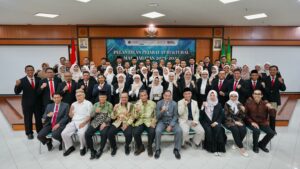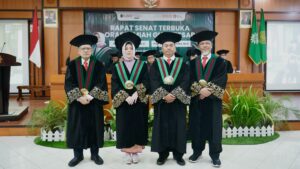10 years ago, Muhammadiyah implemented a fatwa against smoking, including electronic cigarettes or vape. However, from an economic point of view, cigarettes are still a major contributor to the excise tax of the Republic of Indonesia with a total contribution of 9 to 11 percent of the total excise tax. Seeing this phenomenon, the MTCC (Muhammadiyah Tobacco Care Center), which has changed its name to Muhammadiyah Steps, held an online public discussion with the theme Economic Strategy for the Implementation of the Results of Halaqoh Fatwa Haram Cigarettes on Friday (2/9).
The discussion, which was held online on the Zoom meeting platform, was guided by dr. Supriyatiningsih, M.Kes., Sp.OG., and presented several speakers including Drs. Muh. Agus Samsudin, M.M., as the representative of the Public Health Advisors of the Muhammadiyah Central Board, Assc. Prof. Wawan Gunawan Abdul Wahid, Lc., M.Ag., as representative of the Tarjih Council and the Tajdid of the Muhammadiyah Central Board, Dr. Mukhaer Pakkana, SE, MM, as the representative of the Economics and Entrepreneurship of Muhammadiyah Central Board, Muhammad Sayuti, M.Pd., M.Ed., Ph.D., as the Representative of the Higher Education, Research and Development Council of the Muhammadiyah Central Board, as well as dr. Sudibyo Markus, MBA., As the former chairman of the Public Health Council of the Muhammadiyah Central Board as a respondent.
As part of the commitment to implementing Muhammadiyah’s fatwa on smoking, educational institutions under the auspices of Muhammadiyah must also enforce the fatwa strictly. The application of the fatwa is not without reason. In addition to smoking being considered contrary to Islamic teachings, this fatwa is an effort of the organization to keep practising religion as well as possible and also to protect the ummah.
In his presentation, Dr. Mukhaer Pakkana, S.E., M.M., explained that based on research results, The cigarette needs of the Indonesian people are high, especially for the lower class. The increase in cigarette excise tax which has an effect on increasing cigarette prices in the market can be one of the steps to control the amount of cigarette consumption in Indonesia. “In addition to reducing the number of smokers, increasing cigarette excise taxes can also affect the gap between cigarette factory owners and workers. If an analogy needs to be made, the cigarette industry is similar the same as a blood-sucking vampire,” he added. (ays)






